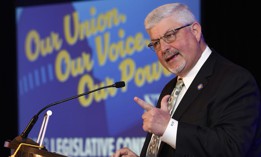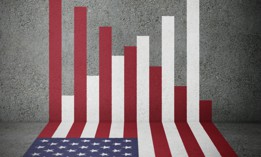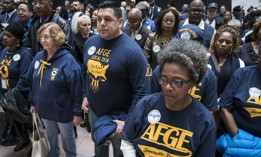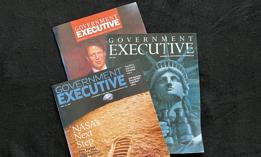Still more troubling has been Barr’s intrusion, apparently for political reasons, into the area of Justice Department action that most demands scrupulous integrity and strict separation from politics and other bias—invocation of the criminal sanction. When Barr initiated a second, largely redundant investigation of the FBI Russia probe in May, denominated it criminal, and made clear that he is personally involved in carrying it out, many eyebrows were raised.
But worst of all have been the events of the past week. The evenhanded conduct of the prosecutions of Roger Stone and Michael Flynn by experienced Department of Justice attorneys have been disrupted at the 11th hour by the attorney general’s efforts to soften the consequences for the president’s associates. More generally, it appears that Barr has recently identified a group of lawyers whom he trusts and put them in place to oversee and second-guess the work of the department’s career attorneys on a broader range of cases. And there is no comfort from any of this in Barr’s recent protests about the president’s tweeting. He in no way suggested he was changing course, only that it is hard to appear independent when the president is publicly calling for him to follow the path he is on.
Bad as they are, these examples are more symptoms than causes of Barr’s unfitness for office. The fundamental problem is that he does not believe in the central tenet of our system of government—that no person is above the law. In chilling terms, Barr’s own words make clear his long-held belief in the need for a virtually autocratic executive who is not constrained by countervailing powers within our government under the constitutional system of checks and balances.
Indeed, given our national faith and trust in a rule of law no one can subvert, it is not too strong to say that Bill Barr is un-American. And now, from his perch as attorney general, he is in the midst of a root-and-branch attack on the core principles that have guided our justice system, and especially our Department of Justice, since the 1970s.
The system that Barr is working to tear down was built up in the aftermath of the Watergate scandals, during which the Justice Department’s leadership was compromised by its support of a president who sought to use the machinery of government to advance his personal interests and prospects for reelection. As Richard Nixon later told David Frost, he believed that “when the President does it, that means it is not illegal.” But the system held, and after two attorneys general and numerous other government officials were convicted for their conduct in these scandals, the Ford administration turned to the task of restoring public trust in government.
President Gerald Ford chose as his attorney general Edward Levi, a distinguished legal scholar and professor who was then president of the University of Chicago. “Levi took restoring faith in the legitimacy of government and adherence to the rule of law as his very highest priority,” his special assistant at the time, Jack Fuller, later recalled . Levi said at his swearing-in that the central goal of the Justice Department must be to sustain “a government of laws and not men,” which he knew would take “dedicated men and women to accomplish this through their zeal and determination, and also their concern for fairness and impartiality.”
Given the Department of Justice’s extraordinary powers to affect lives, and often to do so long before any case goes to court, Levi characterized its proper actions as having a “judicial nature” that demanded, in many instances, a substantial insulation from political influence. And he saw the pursuit of fair, accurate, and equal justice as a shared endeavor, with decisions best made through a sort of “government by discussion,” so that the soundness and integrity of any actions could be tested by the review and consideration of others.
In two short years, Levi enshrined these ideas at the Department of Justice, turning them into articles of faith for its employees. He created new mechanisms of accountability to ensure their endurance, such as the Office of Professional Responsibility, an ethics watchdog for the department. His reforms substantially restored public trust in our justice system. For the past 45 years, the vision he articulated has also inspired thousands of Justice Department lawyers. This was the department that I served, as an assistant U.S. attorney, United States attorney, principal deputy solicitor general, and deputy attorney general in the Carter, Reagan, and first Bush administrations.
Barr’s frontal attack on this system begins with an assault on Levi’s central premise, that ours must be a “government of laws and not men,” in which no person is above the law. Far from emphasizing thorough, transparent, and evenhanded processes—like the investigations presided over by former Special Counsel Mueller and Inspector General of the Department of Justice Michael Horowitz—Barr has done whatever he can to suppress findings adverse to the president, and to endorse conclusions more favorable to Donald Trump.
Even more emphatically, though, Barr has brought with him to the department an extraordinary belief in the need for an all-powerful president that is flatly irreconcilable with Levi’s vision, which restored the Department of Justice to honor and integrity in the mid-’70s. Perhaps most disturbingly, Barr contends that it is virtually impossible for a corrupt president to be held to account by the Department of Justice, or by any independent counsel that it or Congress might appoint.
His views on that point were set forth with breathtaking clarity in June 2018, in an unsolicited 19-page memorandum that Barr sent to then–Deputy Attorney General Rod Rosenstein, arguing that Mueller’s investigation of the president for obstruction of justice was fundamentally misconceived. The president “alone is the Executive Branch,” he wrote, and “the Constitution vests [in him personally] all Federal law enforcement power, and hence prosecutorial discretion.” (The emphasis is his.) Thus, as a matter of constitutional law, Barr concluded that Congress is without any power to bar the president from “[exercising] supervisory authority over cases in which his own conduct might be at issue.” It followed, according to Barr, that the whole idea of a prosecutor within the executive branch operating beyond the president’s direct oversight—even a special counsel like Mueller—was a constitutional nonstarter. So the president’s recent statement that he has a “legal right ” to interfere in criminal investigations just repeats what Bill Barr has told him.
Barr would make real Nixon’s vision that if the president does it, it may not be challenged by the Department of Justice, or from any other agency of the executive branch. But Barr’s efforts to place the president above the law go far beyond foreclosing interference through checks that might arise within his own branch. His department has been very active, and he has personally been quite vocal, in working to cripple the traditional checks and balances on presidential prerogatives that arise from the distinct, co-equal roles of Congress and the courts.
Take, for example, Trump’s categorical stonewalling of Congress’s power to exercise its traditional oversight role by subpoenaing documents and calling witnesses from the executive branch. During his prior term of government service, in the 1980s and ’90s, Barr opposed what he regarded as congressional interference with executive prerogatives. He wrote several opinions on the subject when he served as head of the Office of Legal Counsel. So it should come as no surprise that, as attorney general, he has returned to this familiar theme.
Last May, Barr’s Office of Legal Counsel issued an opinion advising that former White House Counsel Don McGahn was not subject to Congress’s subpoena power, asserting that senior officials have “absolute immunity from congressional compulsion to testify about matters that occur during the course of discharging official duties.” Trump’s government has held to that position, which has provided the analytical core for the sweeping assertion of a right to not even appear at the House’s impeachment hearings, thus exceeding the long-recognized right to raise executive privilege or other specific objections to particular questions when grounds for doing so arguably exist.
In June, OLC issued another opinion, this one advising that the Treasury Department should not provide the House Ways and Means Committee with Trump’s tax returns, despite a statute that requires Treasury to do so. For the critical reasoning, it quoted from one of Barr’s own OLC opinions , which said that Congress must articulate why it needs the particular materials before the executive branch will even consider what, if any, information it will provide.
And in September, OLC said that the whistle-blower report—the one that first brought to light the Ukraine telephone call that became the basis for an article of impeachment—was not a matter of “urgent concern” and thus need not, under the relevant statute, be transmitted to congressional intelligence committees. That opinion provoked a letter from 68 inspectors general throughout the federal government, protesting that such a conclusion was indefensible and would grossly undermine the effectiveness of whistle-blower protections as a check on executive power.
The Justice Department has also been at the forefront of the president’s defiance of Congress’s traditional power of the purse as a check on executive-branch adventurism. On February 15, 2019, the day after Barr was confirmed, the president issued an emergency declaration to divert funds from other appropriations for use in building a border wall. Congress had several times considered and refused to appropriate the requested funds for this purpose, and the president had himself conceded that there was no actual emergency. But Barr’s DOJ has vigorously litigated the cases challenging this action, and thus has worked to undermine Congress’s express constitutional power to control the appropriation of funds.
All of this conduct—including Barr’s personal interventions to influence or negate independent investigations or the pursuit of criminal cases, and his use of the department’s resources to frustrate the checks and balances provided by other branches—is incompatible with the rule of law as we know it, and especially as it has functioned since Levi’s Watergate reforms. Far from recognizing the sensitive “judicial nature” of the department’s work and the need to avoid even the appearance of improper influence and to show that no person is above the law, under Barr, the Department of Justice is actively engaged on many fronts in helping realize Trump’s stated goal of being able to do whatever he wants, free from interference from any branch of government.
Barr’s agenda was confirmed by his November speech to the Federalist Society on“the Constitution’s approach to executive power.” He argues that “over the past several decades, we have seen a steady encroachment on presidential authority by other branches of government,” and that those “encroachments” must end. He purports to justify his position by offering a selective version of American history, discussing the Founders’ intentions with regard to presidential power, characterizing the role the presidency has supposedly played over time, and arguing that, in recent decades, the Founders’ vision has been undermined by actions of Congress and the courts.
Perhaps even more disturbing than Barr’s manifesto for radical change—for the creation of a president with nearly autocratic powers—is the revisionist account of American history on which it is based, and his dogmatic insistence on it in the face of ample evidence to the contrary. Whereas Levi recognized a commitment to intellectual integrity and accountability as the keys to building public trust and defending the rule of law, Barr simply presents as gospel a conveniently distorted vision of the past.
At the beginning of his speech, Barr derides “the grammar-school civics-class version” of our history—the one that generations of students have internalized. It is that the Founders, sensitive from experience to the danger that one part of government might develop tyrannical powers, adopted a complex structure of checks and balances. In that government, power was shared among the three branches through sometimes-countervailing delegations of authority, which made each branch dependent on the others. The numerous checks that the Constitution created to limit the president’s authority—the impeachment power, the House appropriation power, Congress’s power to override vetoes, the need for a congressional declaration of war, and the Senate power to advise and consent, for example—show that presidential tyranny was prominent among their concerns.
According to Barr, the Founders actually were not much concerned about an out-of-control president, as this “civics-class version” suggests. He reasons that history shows a rise in the relative power of Parliament against the King during the mid-18th century, and that by the time of our own Revolution, the evil perceived by the patriots was more “an overweening Parliament” than “monarchical tyranny.” Further, chaotic governance during the Revolution and under the Articles of Confederation pointed out the need for a single executive officer, and after some debate, such a president was included in the Constitution. Of course, none of this negates the specific provisions that the Founders adopted to curb presidential overreach, or suggests that it was not a matter of great concern. Nor does it remotely suggest that the later development of institutions such as judicial review and congressional oversight was out of step with what the Founders had in mind.
Barr’s next piece of history—his account of how things have allegedly proceeded during the intervening 230 years—is the real stunner. He would have us believe that this vision of an all-powerful president that he wants to restore has in fact been a reality for most of our history. Indeed, he says, “more than any other branch, the [American presidency] has fulfilled the expectations of the Framers.” At least, that is, until recently.
But what about the widespread consensus of historians that, throughout the 1800s and until the 1930s, Congress was the dominant branch of government, and that over the course of the 20th century, the balance of power shifted dramatically toward the president? With the exception of the founding generation and a few others, including Andrew Jackson, Abraham Lincoln, Theodore Roosevelt, and Woodrow Wilson, most of our presidents prior to Franklin D. Roosevelt were extremely weak. And without doubt, the greatest expansion of executive power came not early in our history, but during the 20th- and 21st-century era of the imperial president.
According to Barr, all of this is mistaken. Strong and omnicompetent presidents have led our government from the beginning, “protecting the liberties of the American people.” Lately, though:
the deck has become stacked against the executive. Since the mid-’60s, there has been a steady grinding down of the executive branch’s authority, that accelerated after Watergate. More and more, the president’s ability to act in areas in which he has discretion has become smothered by the encroachments of the other branches.
What does he say happened, and what is the nature of these encroachments? He first targets “two aspects of contemporary thought that tend to operate to disadvantage the executive.” The first is the idea that “the greatest danger of government becoming oppressive arises from the prospect of executive excess.” No doubt Levi’s Watergate reforms had something to do with this, and Barr seems quite unhappy with them and their consequences.
The second is the “notion that the Constitution does not sharply allocate powers among the three branches, but rather the branches, especially the political branches, ‘share’ powers.” Barr seems to be obsessed with the notion of shared powers, and is quite keen on eradicating the whole idea : “Whenever I see a court opinion that uses the word share , I want to run in the other direction.”
The last half of Barr’s speech purports to address the ways that, “in recent years, both the legislative and judicial branches have been responsible for encroaching on the presidency’s constitutional authority.”
First, he says, Trump’s congressional opponents inaugurated “the resistance” and used “every tool and maneuver available to sabotage the functioning of his administration.” Then he alleges that the Senate has engaged in “unprecedented abuse of the advise-and-consent process to draw out the approval process for nominees.” Never mind that Republicans were at all times in the majority and have had unprecedented success in confirming their judicial nominees.
Finally, he claims that Congress has engaged in “constant harassment” by trying to “drown the executive branch with ‘oversight demands’ for testimony and documents.” He does not mention the administration’s repeated assertion of a categorical, prophylactic executive privilege against even having to appear, respond, or assert any specific privilege based on the facts. Nor does he note that this outrageous denial of Congress’s established power has been largely successful, or that it has even been raised in the impeachment context, where Congress’s constitutional power to inquire is at its apex.
But perhaps the most outrageous and alarming ideas that Barr advances come in his attacks on the judiciary, which occupy fully a third of his speech. In his mind, it seems, the courts are the principal culprit in constraining the extraordinarily broad powers that the president is constitutionally entitled to exercise. His discussion ignores a pillar of our legal system since almost the very beginning—Chief Justice John Marshall’s magisterial pronouncement in the early days of our republic that “it is emphatically the province and duty of the judicial department to say what the law is.”
Barr complains that the judiciary “has appointed itself the ultimate arbiter of separation-of-powers disputes between Congress and the executive,” saying that the Framers did not envision that it would play such a role. Barr yearns for a day when the president can bully everyone else in government, and leave them no ability to seek relief in court.
Barr complains specifically that the role of courts to determine the law has only recently invaded areas of decision making that the Founders intended to leave to the president, and has thus impeded the president’s exercise of discretion in ways that he says would never have happened a few decades ago. President Harry Truman, who 70 years ago was barred by the Supreme Court from seizing steel plants by executive order in the name of national defense, might be surprised to hear that.
And Barr is quite clear about what he wants the courts to keep their noses out of. They have no proper role in “constitutional disputes between the other two branches,” because “the political branches can work out their constitutional differences without resort[ing] to the courts.” More generally, he claims that courts have no business second-guessing decisions of the executive in areas that “cannot be reduced to tidy evidentiary standards and specific quantums of proof,” or that involve an exercise of “prudential judgment.” Nor should they be permitted to inquire into the “motivation behind government action.” Three cheers for a toothless rule of law that lets the president do anything he desires for any reason.
After citing several specific instances in which judicial scrutiny of Trump’s actions allegedly went off the rails, Barr closes with a lengthy discussion of what he apparently views as the worst such usurpation to date—the Supreme Court’s 2008 Boumediene decision. In that case, a majority that included three Republican appointees ruled that the traditional and well-recognized habeas corpus jurisdiction of the federal courts applied not only on American soil, but also in the anomalous precincts of the Guantánamo Bay enclave, where the United States exercises de facto sovereignty. For that reason, the Court said, the political branches could not categorically suspend the constitutional writ of habeas corpus there. But for Barr, “the idea that the judiciary acts as a neutral check on the political branches to protect foreign enemies from our government is insane.”
Barr’s Federalist Society speech suggests that he is ready to say nearly anything in pursuit of his lifelong goal of a presidency with unchecked powers. As Napoleon is reputed to have said, the man who will say anything will do anything. That Barr has also repeatedly used his authority as attorney general to tailor the position of the United States, in court and in legal opinions, to empower such an unworthy incumbent as Donald Trump to do whatever he wants suggests that this is correct.
The benefit of the doubt that many were ready to extend to Barr a year ago—as among the best of a bad lot of nominees who had previously served in high office without disgrace—has now run out. He has told us in great detail who he is, what he believes, and where he would like to take us. For whatever twisted reasons, he believes that the president should be above the law, and he has as his foil in pursuit of that goal a president who, uniquely in our history, actually aspires to that status. And Barr has acted repeatedly on those beliefs in ways that are more damaging at every turn. Presently he is moving forward with active misuse of the criminal sanction, as one more tool of the president’s personal interests.
Bill Barr’s America is not a place that anyone, including Trump voters, should want to go. It is a banana republic where all are subject to the whims of a dictatorial president and his henchmen. To prevent that, we need a public uprising demanding that Bill Barr resign immediately, or failing that, be impeached.












